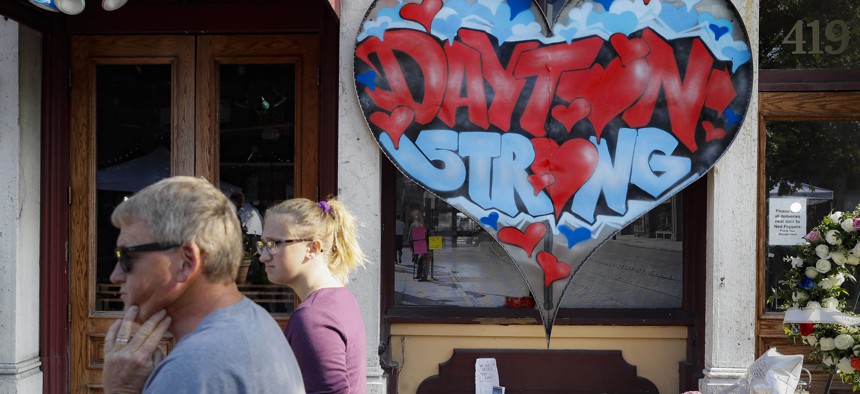Two Ohio Cities Sue State Over Gun Background Check System

Pedestrians pass a makeshift memorial for the slain and injured victims of a mass shooting that occurred in Dayton, Ohio in August 2019. AP Photo/John Minchillo
Dayton and Columbus officials announced their lawsuit on Monday, saying the state attorney general’s office needs to fix a system that doesn’t always contain information about people with felony convictions.
The mayors of Dayton and Columbus sued the Ohio Bureau of Criminal Investigation this week, saying the agency is failing to adequately collect information on people with felonies for the state’s gun background check system.
The lawsuit alleges that the BCI, a division of the Ohio attorney general’s office, has been engaged in a “dangerous failure…to fulfill its mandatory obligation to collect and report disqualifying criminal conviction information into the state and federal background check system databases.”
An auditor’s report from October 2019, which is cited in the suit, found more than half of the state’s 88 counties had at least one court or law enforcement department that failed to report criminal records on time or at all. The system for inputting information, the auditor concluded, is “a systemic failure” and “needs immediate attention.”
Dayton Mayor Nan Whaley, a Democrat, said during a press conference on Monday that people “expect laws on our books to be enforced.”
“It’s just common sense that if someone is prohibited from buying a gun, including through a felony conviction or history of domestic violence, they shouldn’t be able to pass a background check because of a bureaucratic mistake,” she said.
Getting accurate information into the state and federal background check databases is key right now, the suit says, because gun sales in Ohio skyrocketed during the coronavirus pandemic, following a pattern seen in many states. Between March and September, background checks for firearms in Ohio were 70% higher than the previous year.
“Because of the failures of BCI, each of those background checks was incomplete, potentially missing information that the potential purchaser was prohibited by law from possessing a firearm,” the lawsuit reads.
The civil complaint was filed in Franklin County Common Pleas Court and seeks to have a judge order BCI and the attorney general’s office to fix the gaps in reporting around criminal convictions, outstanding arrest warrants, and in-patient mental health stays at hospitals, among other factors.
In response to the suit, Bethany McCorkle, the communications director for Ohio Attorney General Dave Yost, a Republican, said that the “complaint has high drama, low substance and no solutions.” She said that the state is already working to improve the background check system but that the power to eliminate errors ultimately lies in the local government agencies who report the information to the state.
“We cannot force them to provide the information," she said in a statement. "The problematic link in this chain is not BCI, as the complaint notes.”
Cities have sued states over gun control before—most recently in October when Philadelphia sued Pennsylvania in an effort to create their own gun laws stricter than those of the state. Cities have also sued the federal government over background checks for so-called “ghost guns.” The lawsuit in Ohio appears to be the first time a city has sued a state over the administration of its background check system.
Ohio’s gun laws have attracted attention since the mass shooting in Dayton in August 2019, when a man opened fire on a crowded street, killing nine and injuring 27 before he was killed by responding police officers.
In the wake of the Dayton shooting, many Ohio officials, including Republican Gov. Mike DeWine, called for stronger background checks in the state. Their calls were echoed by national advocates for universal background checks at point of sale for all firearm purchases. But legislative gun control proposals—some of which called for the addition of more information to background check systems—stalled in the Republican-controlled legislature. If they’re not passed by the end of the year, the process will have to begin again.
Some Republicans argued that the Dayton shooting didn’t prove the need for background checks. Shortly after the shooting, former high school classmates of the shooter said that he had been suspended for compiling a “hit list” and a “rape list”—but police noted that a high school suspension would not have shown up on a firearm background check. The Associated Press found nothing in the shooter’s history that would have prevented him from purchasing the rifle with extended ammunition magazines that he used in the shooting.
In August, DeWine said he was still committed to passing gun control legislation because “we owe it to the victims…to the families and to all Ohioans to finish the job and get this done.” The same month, he debuted a pilot project in 10 counties that aims to input outstanding warrants into background check systems. The goal of the project is to improve “the quality and the timeliness of the information that we are getting from our locals with regard to convictions, mental health adjudications, substance abuse adjudications” and other information that gets plugged into the federal National Instant Criminal Background Check System.
Some advocacy groups are also trying to get an initiative on the ballot in 2021 to make background checks a requirement on nearly all gun sales in the state.
While a universal background check proposal is likely to face some resistance, Columbus City Attorney Zach Klein said that everyone should be able to agree with the lawsuit’s goal of fixing the gaps in the current system.
“Regardless of where one stands on gun laws, nobody should disagree with the central premise of this litigation: Keeping guns out of the hands of criminals by improving the background system so that it’s accurate and complete,” he said.
Emma Coleman is the assistant editor for Route Fifty.
NEXT STORY: AI helps Toledo get the lead out






